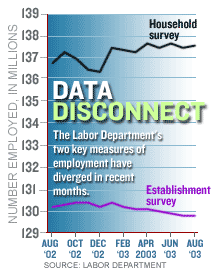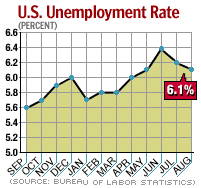NEW YORK (CNN/Money) -
If you're sick of hearing about how bad the labor market is, there's a small group of economists saying something that's probably music to your ears: The job market's not as bad as it looks.
Unfortunately, many economists disagree with them.
Carnegie-Mellon professor Allan Meltzer, a scholar at the American Enterprise Institute, a conservative think tank, presented the minority case in a recent opinion piece in the Wall Street Journal.

Meltzer noted a contradiction between the government's monthly report on unemployment and its report on payrolls.
According to its survey of businesses, payrolls outside the farm sector are 2.7 million jobs lighter than they were when President Bush took office in January 2001. Its "household survey," which generates the unemployment rate, shows only 220,000 fewer people employed since then.
The Labor Department is due to release the September surveys Friday. Economists, on average, expect that the unemployment rate edged up to 6.2 percent, while payrolls fell by another 25,000 jobs, according to Briefing.com.
Meltzer thinks the household survey is more accurate, since it's more likely to include small start-up companies and people who are self-employed. Based on this belief, Meltzer says recent reports of steady job losses and super-high productivity -- a measure of output per worker hour -- are mistaken.
"Don't believe ... the widely reported loss of millions of manufacturing jobs since the Bush administration took office," Meltzer wrote. "All these alleged facts are either wrong or greatly exaggerated, based on the same faulty source."
| Related stories
|

|
|
|
|
While Meltzer and some who support him might seem to have a political agenda, since they're tied to conservative causes or have been vocal proponents of President Bush's economic policies, some mainstream economists think they're on to something -- small businesses and start-up firms may very well be turning up in one survey and not the other.
"After periods of a large slump in employment, there may be advantages to canvassing homes," said Steven Wieting, senior economist at Citigroup.
Certainly, small businesses, in total, employ more workers than big businesses, according to the National Federation of Independent Business, a small-business advocacy group. These same small businesses created millions of jobs in the five years ending in 1998, when bigger companies were downsizing.
More recently, non-farm "proprietors' income," a Commerce Department gauge of the income of small-business owners and the self-employed, has risen 8.4 percent in the past year, compared with the sluggish 1.4 percent growth in private wages and salaries.
"This [gain in proprietors' income] is small-business job creation, we think, and it's more useful at this point in the business cycle than it would otherwise be," Wieting said, when it comes to trying to gauge the strength of the job market.
A bad predictor of job growth
Nevertheless, most economists doubt that the household survey -- which has shown a net gain of 313,000 new jobs in the past year, versus a loss of 463,000 jobs in the payroll survey over the same period -- paints the most accurate picture of the job market.
Nor has the household survey historically been a better leading indicator of job growth, according to a recent study by Anthony Chan, chief economist at Banc One Investment Advisors.

According to his research, in the first 21 months of economic recoveries since the 1950s, the payroll survey showed average job growth of about 3.59 million, while the household survey showed job growth of just 3.09 million. In other words, Chan said, the payroll survey usually does a better job of picking up a labor-market rebound.
"This clearly shows that relying on the household survey's employment measure as a barometer of labor market conditions is not only risky, but also an incorrect assumption," Chan said.
What's more, the household survey employment numbers include a 1 million-job jump from December 2002 to January 2003 that was simply the result of Labor Department adjustments in number-crunching. As a result, this year's employment data aren't comparable to last year's.
And the household survey is based on a smaller sample and is considered more volatile than the business survey, so many economists think it deserves less weight.
"My rule of thumb is to look at both the household and payroll surveys together, giving three-quarters weight to the payroll survey and one quarter to the household survey," said Ethan Harris, chief economist at Lehman Brothers.
Few other signs of a turnaround
Looking at the surveys together in this way may reveal that job losses in recent months haven't been quite as bad as first reported -- but there have still been plenty of job losses, Harris said.
In fact, there are very few signs of actual improvement in the job market. The four-week moving average of new weekly unemployment claims is currently 405,300, and it's been above 400,000 for five straight weeks -- the level considered a sign that the labor market is getting worse.
Consumers, meanwhile, say jobs are scarce. In the latest sentiment survey by the Conference Board, a private research firm, the percentage of respondents saying jobs were "hard to get" rose to 35.3 percent -- the highest level since December 1993.
"Whether you're going into business for yourself or not, you're still looking at a very anemic job market," noted former Federal Reserve economist Lara Rhame, now senior economist with Brown Brothers Harriman.

|

